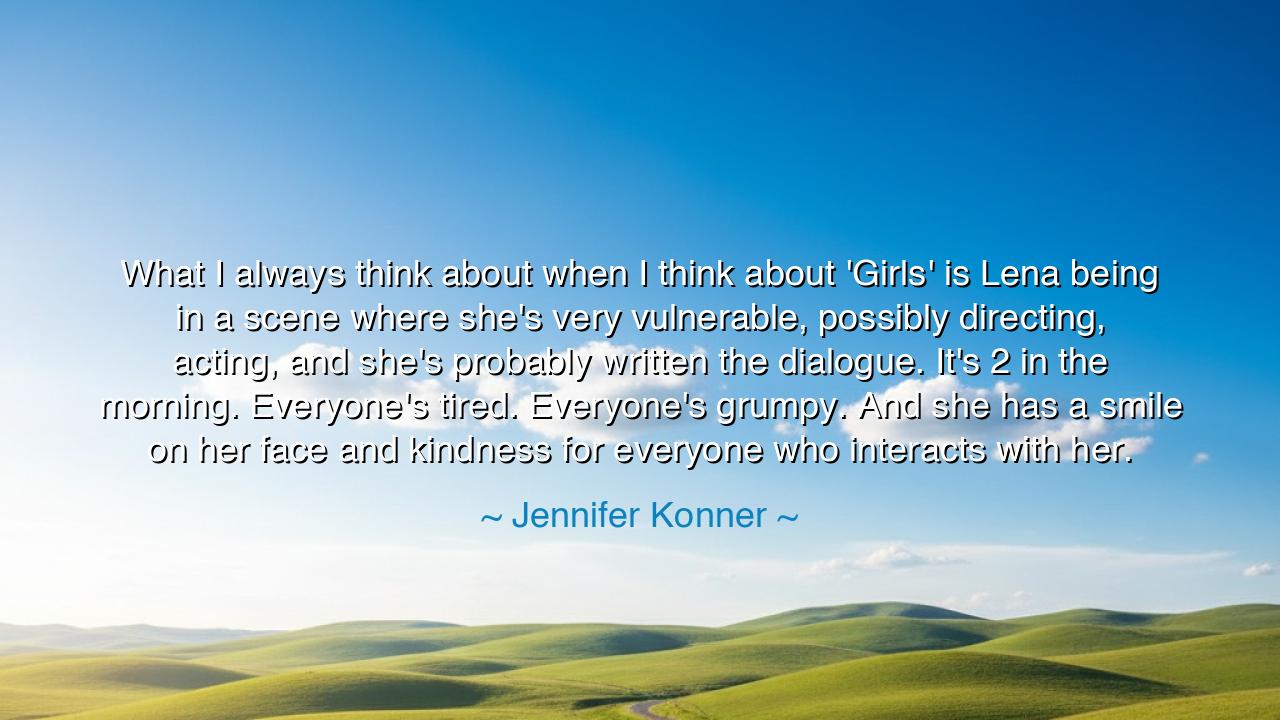
What I always think about when I think about 'Girls' is Lena
What I always think about when I think about 'Girls' is Lena being in a scene where she's very vulnerable, possibly directing, acting, and she's probably written the dialogue. It's 2 in the morning. Everyone's tired. Everyone's grumpy. And she has a smile on her face and kindness for everyone who interacts with her.






The words of Jennifer Konner resound with reverence, painting an image not of grandeur but of quiet heroism: “What I always think about when I think about Girls is Lena being in a scene where she's very vulnerable, possibly directing, acting, and she's probably written the dialogue. It's 2 in the morning. Everyone's tired. Everyone's grumpy. And she has a smile on her face and kindness for everyone who interacts with her.” These words are not merely a memory of labor on a set—they are a hymn to endurance, to leadership, and to the sacred power of maintaining light in the darkest hour.
To be both vulnerable and yet still to lead is a paradox only the brave embrace. Lena, by acting in her own creation, by directing while exposed in body and soul, carries a double weight. She is both artist and leader, both participant and guide. And yet, when the night stretches long, when fatigue gnaws at the spirit of all, she does not yield to bitterness. She smiles. She offers kindness. In this, her strength shines brighter than any script, for it is easy to command when all are rested, but it is divine to inspire when all are weary.
This vision of her smile in the hour of exhaustion recalls the story of Joan of Arc, who in the dead of night, under the weight of fear and battle, would still speak words of encouragement to soldiers hardened and hungry. She was young, unarmored in experience, and yet her light did not falter. The men, weary and grumbling, saw in her not despair but a flame that refused to be extinguished. And in that flame, they found their strength. So it is with Lena, as Konner describes her—vulnerability turned into leadership, gentleness turned into power.
For what is a smile at two in the morning? It is no ordinary smile. It is a sacrifice, a deliberate offering of light to those who have none left within themselves. In such a smile is the wisdom of the ancients: that one’s true strength is measured not by what one achieves alone, but by the energy one lends to others in their weakness. Leaders are not crowned by titles but revealed in moments when they give joy to the weary, steadiness to the restless, and kindness to the grumpy.
The words also remind us that art itself is born not only in daylight inspiration but in toil, in the long hours when flesh grows weak. The artist, like the laborer, must wrestle with fatigue. Yet those who can carry themselves with grace in such moments, who smile instead of frown, who show patience instead of scorn—these are the ones who leave behind works of enduring power. The greatness of Girls was not merely in its writing or performances, but in the atmosphere created by such leadership, in which kindness guided the weary hands that shaped the show.
The lesson is clear: in your own life, when the hour grows late and all around you grow tired or irritable, be the one who smiles. Be the one who carries gentleness into the shadows. For such moments reveal character far more than triumphs achieved in comfort. To give kindness when it costs you nothing is courtesy; to give kindness when you are weary is greatness.
Therefore, let us all take this wisdom as torchlight for our path. In work, in family, in friendship—strive to be the one who holds steady, who remembers compassion even when the night grows long. Do not think only of your own burden, but lift the spirits of those around you, with word, with gesture, with patience. Like Lena, as Konner recalls her, keep your smile alive even when the world is fraying at the edges.
Carry forward this teaching: “She has a smile on her face and kindness for everyone who interacts with her.” May it remind you that the greatest legacy you may leave is not only the work of your hands, but the warmth you bring to others in their hardest hours. That is the true art of life—an art greater even than words on a page or scenes upon a stage. It is the art of keeping the fire of kindness alive when the night is deepest.






AAdministratorAdministrator
Welcome, honored guests. Please leave a comment, we will respond soon